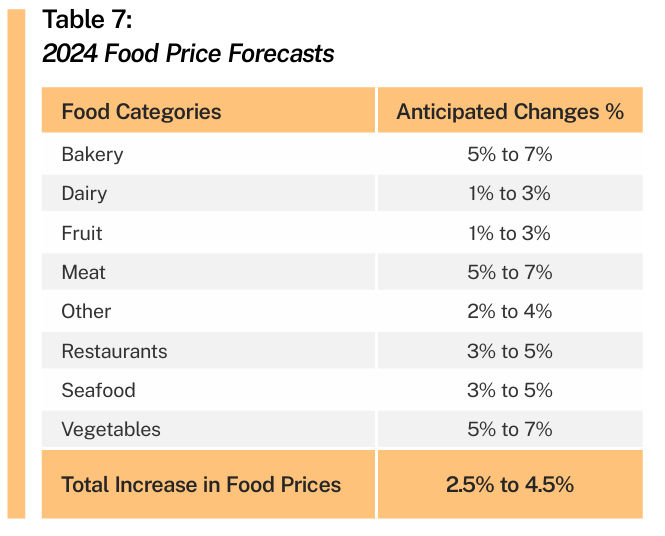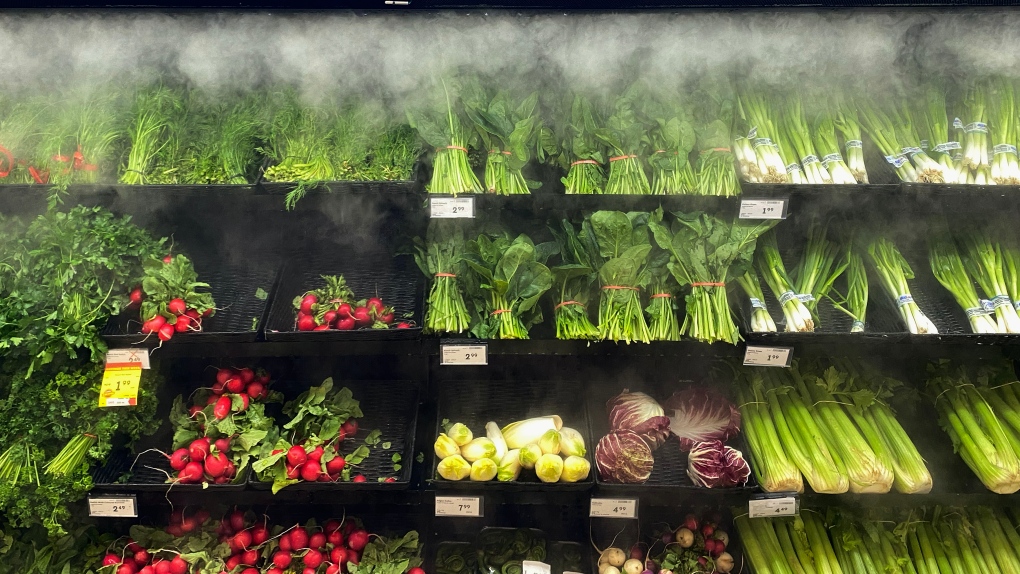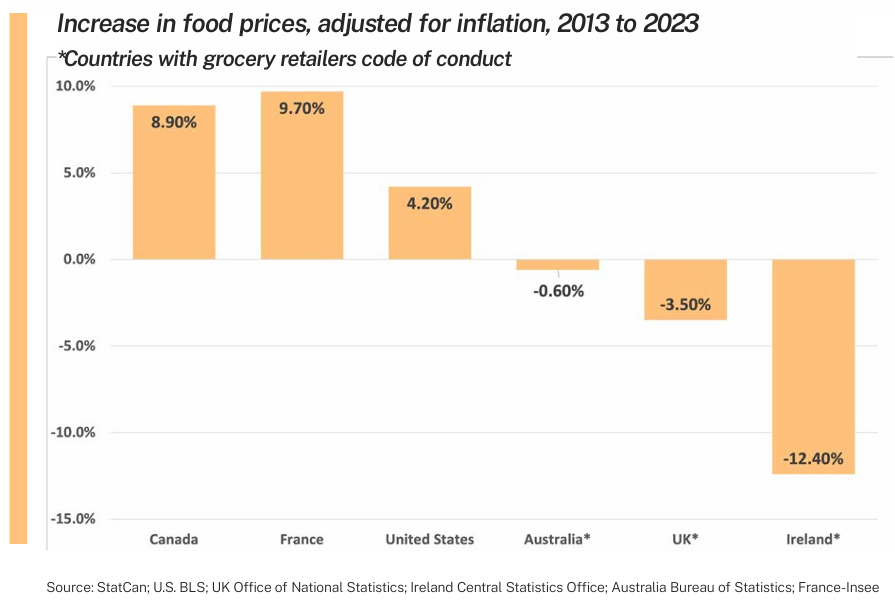Canadian family of four will pay $700 more for food in 2024, says report
Grocery prices will continue to climb in 2024, but not as steeply as they did over the past two years, a new report predicts.
The 2024 edition of Canada’s Food Price Report, released Thursday, forecasts food prices will rise by 2.5 to 4.5 per cent next year.
For a family of four, the total grocery bill for the year is expected to be $16,297.20 – up $701.79 from last year, the annual report prepared by the University of Guelph, Dalhousie University, University of British Columbia and the University of Saskatchewan said.
“It’s kind of a good news, bad news situation,” said Kristina Kupferschmidt, a University of Guelph PhD student and one of the report’s authors. “The good news is it's not increasing as much as it was last year – I know last year was a real crunch for a lot of people. We're really facing an affordability crisis in Canada. But the bad news is [prices are] still continuing to go up, especially in categories like vegetables, meat and bakery.”
 Source: Canada's Food Price Report 2024
Source: Canada's Food Price Report 2024
Freda Love is a Kitchener resident who says she'll get by, as her children are all grown up.
"I really don't know how some of these families cope who have a lot of children," said Love.
She added that she tries to cut costs by price matching and shopping around for sales. On Thursday, she planned to go to three different grocery stores in hopes of saving money.
"I do my usual route of three stores every week," explained Love. "I've just spent $71 in my first store."
While other feel hopeless and helpless.
"We have to survive. It's upsetting but what can we do?" questioned another Kitchener resident.
CANADIANS SPENT LESS ON GROCERIES IN 2023 DESPITE INFLATION
In 2023, food prices rose by 5.9 per cent. But in what Kupferschmidt calls one of the report’s “most interesting findings,” Canadians spent less on groceries than the year before.
That suggests shoppers are either buying less food, purchasing lower quality items, or substituting cheaper alternatives, the report said, noting Canadians are feeling the crunch of higher rent and utility costs as well as rising personal debt.
“It’s really like their hands are tied,” Kupferschmidt said. “They’re not able to make the decisions they would want to make if food was more affordable.”
At the same time the number of people using food banks is soaring.
“Those two pieces together I think are really telling of the story that’s happening. People aren’t able to buy food the same way that they have historically,” Kupferschmidt said.
Still, shoppers have felt the pinch this year.
"We're spending probably 50 to 60 dollars a week more than we used to," said Kitchener resident Linda Keithlin.
 Produce is shown at a west-end Toronto Sobeys grocery store on June 26, 2023. (THE CANADIAN PRESS/Graeme Roy)
Produce is shown at a west-end Toronto Sobeys grocery store on June 26, 2023. (THE CANADIAN PRESS/Graeme Roy)
WHY ARE FOOD PRICES INCREASING?
The report found climate change is a major driver behind increasing food costs with erratic weather patterns, droughts, food and fires impacting harvests.
Geopolitics also has an important impact.
“Last year, we saw a major spike in bakery [costs], and it's believed that it was strongly associated with the Ukrainian war,” Kupferschmidt said.
Energy costs and inflation are also factors.
As for evidence of profiteering by grocery giants, the report cited a report from the Bank of Canada that found while grocery company’s markups rose after COVID-19, the markup was inflationary.
“It’s not to say it isn’t happening, but there’s not data to support that it’s happening right now,” Kupferschmidt said.
A study by Canada’s Competition Bureau found Canada’s three largest grocers – Loblaw, Sobeys, and Metro – collectively reported more than $100 billion in sales and $3.6 billion in profits last year.
The regulator said more competition is needed in Canada’s highly-concentrated grocery industry to help keep prices in check.
Meanwhile the country’s first grocery code of conduct is under development. The authors of the Food Price Report say its imminent introduction “is a momentous development with promising implications for consumers and the industry.”
Countries with similar codes have seen more modest increases in food prices compared to Canada.
 Source: Canada's Food Price Report 2024
Source: Canada's Food Price Report 2024
CTVNews.ca Top Stories

LIVE UPDATES Uncontained L.A. wildfires are still burning. Here's the latest as firefighters battle the flames
A series of wildfires are tearing through densely populated parts of the Los Angeles, Calif. area. Five people have been reported dead. About 130,000 have been asked to evacuate. Nearly 2,000 homes and other buildings have been destroyed after the fires charred about 108 square kilometres.
'True when I said it, true today': former Canadian PM Harper pushes back against Trump on social media
Former prime minister Stephen Harper doesn’t find U.S. president-elect Donald Trump’s jibes about Canada becoming the 51st U.S. state very amusing.
NEW Tipping guide to Canada: When, where and how much to tip for restaurants, taxis and more
CTVNews.ca has created an entirely unofficial guide to tipping in Canada to help visitors, newcomers and curious Canadians navigate the shifting social norms of when, where and how much to tip.
Can the U.S. really make Canada the 51st state?
Talk of Canada becoming the 51st American state has raised an existential question on this side of the border: Could it be done? Could the maple leaf make way to the stars and stripes? According to several experts, it may be possible, but not painless.
Cape Breton police ask for public's help in finding Justin MacDonald's remains
Police in Cape Breton are asking for the public’s help in finding the remains of a missing man they believe was murdered.
'This isn't just my mom's story,' says daughter of woman allegedly killed by partner
Abigail Robson says she moved from Nova Scotia to Alberta as a young girl with her mother 10 years ago for a fresh start.
U.S. says it has no plans to increase military presence in Greenland
The United States has no current plans to increase its military presence in Greenland, the U.S. embassy in Copenhagen said on Thursday, after President-elect Donald Trump expressed renewed interest in acquiring the vast Arctic island.
Prince William praises his wife Kate as he wishes her a happy birthday
Prince William praised the strength of the Princess of Wales after a turbulent year, offering a 43rd birthday wish on social media on Thursday that described her as an incredible wife and mother.
How cold does it need to get before iguanas start falling out of trees in Florida?
It's a South Florida phenomenon that draws amusement from across the country — when temperatures drop below a certain level, cold-stunned iguanas start falling out of trees.

































